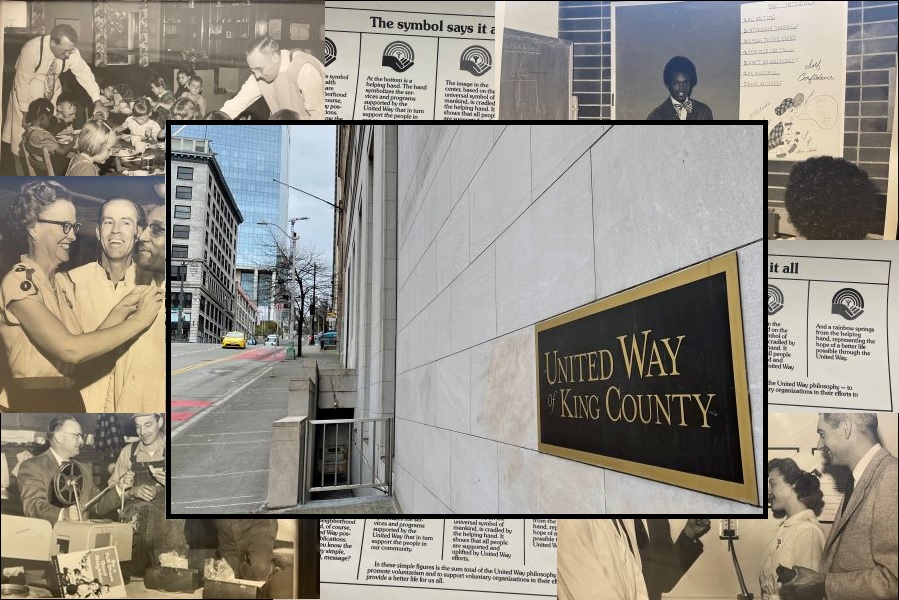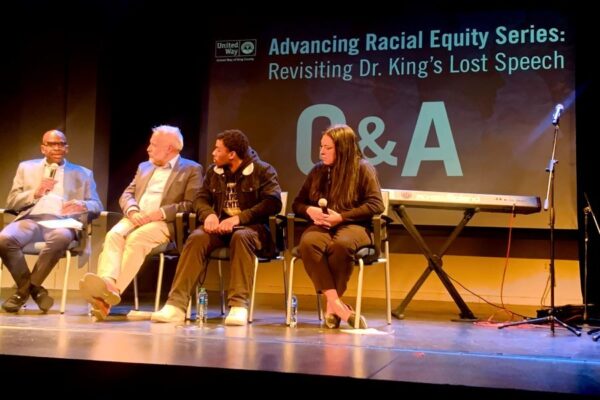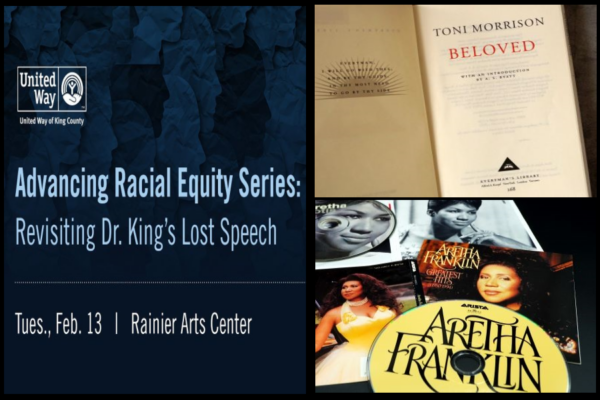An Honest Look at Our History, and a Commitment To Do Better
United Way of King County has been at work addressing the needs of local residents since 1921, which means we’re older than the states of Alaska and Hawaii, television and the Internet, 17 U.S. presidencies and the discovery of antibiotics. It also means we were in existence when the federal government adopted the 1956 Indian Relocation Act, which sought to assimilate Indigenous people by eliminating their reservations and pressuring them to live in urban areas.
The draconian measure offered promises of jobs, housing and training, yet those promises often went unfulfilled. Locally, it meant many Indigenous people in King County were left homeless, jobless and impoverished.
We were also here during the establishment of Japanese internment camps from 1942 to 1945 in response to World War II—mandates that forced scores of citizens and residents into incarceration without due process. According to HistoryLink.org, Japanese Americans from Bainbridge Island in nearby Kitsap County were the first in the nation to be evacuated, on March 30, 1942. Seattle evacuations soon followed; in total 9,600 Japanese Americans in King County were displaced and incarcerated.
And it means we were here during the Seattle officials’ efforts to keep the city racially segregated. The city denied African Americans, Asian Americans and Jewish Americans from living in certain areas via Racial Restrictive Covenants, which according to University of Washington archives became widespread nationwide when the U.S. Supreme Court validated the covenants in 1926. Racial Restrictive Covenants were outlawed by the Fair Housing Act of 1968, but they remained a de facto practice locally.
According to the UW archives, while most Seattle residents of color were crowded into undesirable tracts of substandard housing, some residents of affluent Queen Anne ensured minorities stayed put with clauses in their home deeds that read: “No person or persons of Asiatic, African or Negro blood, lineage, or extraction shall be permitted to occupy a portion of said property.”
United Way played no role in these atrocities, the effects of which still reverberate throughout our county. But we were here. We were reputed for helping the lowest and neediest among us. And through our direct service we saw firsthand how racist policies helped create the very impoverished and oppressed underclass that we served.
These were times when status quo invited, if not implored, us to speak out—to be, as Martin Luther King Jr. once orated, “drum majors for justice.”
We did not speak out.
What role does a 101-year organization play upon discerning its history, acknowledging its complicity and embracing its accountability? How do we and other philanthropic organizations and human service providers account for the injustices that occurred and the harms still felt?
These are the questions we’re wrestling with at United Way as part of our commitment toward a racially just community.
Our goals around racial justice and being an anti-racist organization must be dependent upon the understanding of where we may have harmed or have caused harm—either through action or inaction. This is work we must do, even as we encourage others to find ways to be active participants in transforming our community.
This is work I embrace in part because, as an African American raised in Seattle, I know firsthand the city’s practice of race discrimination in housing. I grew up in working class Beacon Hill in South Seattle, and back then I wondered why my parents—who were perceived as middle class—chose that location.
One day, my mom sat me down and said, “Knowing we were going to have a family, we wanted to have a home, but we found that for a lot of places we wanted to live, realtors wouldn’t show us those homes. They would say, ‘This area is not available,’ or ‘We can show you this home, but only after dark.’ The seller didn’t want their neighbors to know they were potentially selling the home to a Black family.”
We understand that acknowledgment is not enough: We are working to transform those communities, through racial equity-based programs that address immediate needs and policy advocacy to undo systemic racism and inequality.
United Way President & CEO Gordon McHenry, Jr.
My mom told me that there were folks at my dad’s work [Boeing] who were astounded and said, “Let us buy the home, and we’ll just transfer it to you.” She said, “Your dad and I said no. We are going to live in a neighborhood and a home where we can live and be true to ourselves.” So, they bought a house that became our home on a street with no sidewalks, where the first two homes on the block were leftovers from Holly Park Section Eight housing.
This was in the city of Seattle—a place where my mom and aunt had moved to escape segregated Texas. So, you wonder what was the role of government in perpetuating that inequity and what was the role of philanthropists and charities in accepting that and not being challenged to undo that reality and that harm?
Even though those restrictive covenants are no longer enforced, communities of color still struggle with disproportionality in terms of housing instability and the need of supportive housing. That is why we understand that acknowledgment is not enough: We are working to transform those communities, through racial equity-based programs that address immediate needs and policy advocacy to undo systemic racism and inequality.
And we’re not alone: Next week, I’ll be meeting with United Way Worldwide President and CEO Angela Williams as well as other African American CEOs of United Ways nationwide for discussions on how United Ways can be more visible across the country in terms of race and social justice. We will discuss areas where we’ve been complicit in policies and actions that have harmed our communities and steps to take to heal and repair that harm. Check here for updates in an upcoming blog post.





Comments